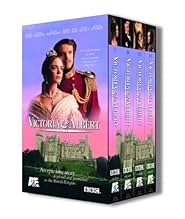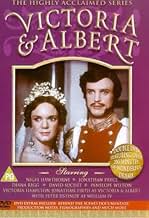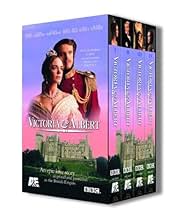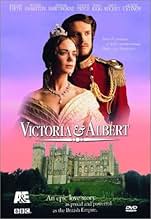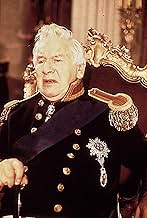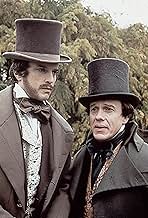Victoria & Albert
- Minissérie de televisão
- 2001
- 3 h 20 min
AVALIAÇÃO DA IMDb
7,4/10
1,1 mil
SUA AVALIAÇÃO
A apaixonada história de amor que foi o longo casamento da Rainha Vitória e do Príncipe Alberto.A apaixonada história de amor que foi o longo casamento da Rainha Vitória e do Príncipe Alberto.A apaixonada história de amor que foi o longo casamento da Rainha Vitória e do Príncipe Alberto.
- Ganhou 1 Primetime Emmy
- 1 vitória e 3 indicações no total
Explorar episódios
Enredo
Você sabia?
- CuriosidadesJonathan Cecil, who plays a servant of Queen Victoria, is the great-grandson of Queen Victoria's last Prime Minister Lord Robert Gascoyne-Cecil, 3rd Marquess of Salisbury.
- Erros de gravaçãoAt a state occasion prior to Victoria's marriage the orchestra is playing music from Strauss's operetta 'Die Fledermaus' which would not be written until many years later in 1874.
- Citações
Prince Albert: [Victoria bangs on Albert's study door] Who is it?
Victoria: [In a loud annoyed voice] What do you mean? "Who is it?" It's your queen!
Prince Albert: [Victoria takes a deep breath and calms down a bit knocks on the door calmly] Who is it?
Victoria: [In a calm and quiet voice] It's your wife.
[Albert opens the door and Victoria goes in and closes the door quietly]
- ConexõesVersion of A Rainha Vitória (1937)
- Trilhas sonorasZadok the Priest
George Frideric Handel (as Georg Friedrich Händel)
Avaliação em destaque
God, the Brits are good at this sort of thing! A 180-minute history lesson presented as a story of true love. Or maybe it's the other way round. Anyway the whole thing spins along at a merry pace, especially the first half with the intrigue surrounding Victoria's ascent to the throne and her marriage to Albert. Victoria Hamilton and Jonathan Firth really convince as V & A, as does Penelope Wilton as Victoria's domineering mother. We get the usual lashings of fine supporting performances from Nigel Hawthorne (Melbourne), John Wood (Wellington), Alex McCowen (Peel), Peter Ustinov (William IV), Delena Kidd (Queen Adelaide), Diana Rigg (Baroness Lentzen) etc etc. In fact the Baroness was just about the only character in the cast that doesn't have a piece of Australia named after them. As far as I know the only one of them that actually made it out here was Victoria's younger son Prince Alfie who was shot at by some deranged person in Mosman circa 1869. The leading teaching hospital in Sydney is named after him (how's that for trivia?)
Yes, the historical record is played around with a bit my sources have Baroness Lentzen (Victoria's governess) being given her matching orders in 1842, not 1840, and Albert didn't actually save Victoria from assassination at the hands of an Irish lunatic, though his progressive views on insanity as a defence to crime may have helped to save some of the insane from the hangman (US politicians take note). However, it was probably from Albert that Victoria got her Victorian morality, and he certainly was of great influence some say he was virtually King while he was alive, at least behind the scenes. As a German he had to keep a low profile in xenophobic Britain, but he gets the credit for the success of the Great Exhibition of 1851; even if Paxton (Richard Briers) actually designed the glass and cast iron `Crystal Palace' in which it was held, Albert had the sense to see that, flimsy as it seemed, Paxton's design was an ideal solution.
It is also sometimes forgotten that Victoria and Albert started out married life when barely out of their teenage years. Both were strongly influenced by older and more experienced people yet both managed to break free. While Albert may have been the better organised and disciplined of the two, Victoria had a remarkable determination to succeed at a particularly tough job. By the end of her long reign the British monarchy had been quietly transformed.
The voluminous correspondence of both parties (the Victorians seem to have written everything down) certainly suggest that Victoria was crazy about Albert, her first cousin, almost from the start, and that Albert, not so keen on Victoria to start with despite the dynastic advantages, grew to love her deeply. This is beautifully laid out in the film, and amongst all the splendour there is a remarkable intimacy. Someone (Melbourne?) suggests at one stage that Albert, through his influence over Victoria, had saved the British monarchy `for another 100 years.' Clearly, he is needed now. Somehow one cannot imagine an equally uplifting account of the present Queen and her consort being made, either now or in another 100 years.
Yes, the historical record is played around with a bit my sources have Baroness Lentzen (Victoria's governess) being given her matching orders in 1842, not 1840, and Albert didn't actually save Victoria from assassination at the hands of an Irish lunatic, though his progressive views on insanity as a defence to crime may have helped to save some of the insane from the hangman (US politicians take note). However, it was probably from Albert that Victoria got her Victorian morality, and he certainly was of great influence some say he was virtually King while he was alive, at least behind the scenes. As a German he had to keep a low profile in xenophobic Britain, but he gets the credit for the success of the Great Exhibition of 1851; even if Paxton (Richard Briers) actually designed the glass and cast iron `Crystal Palace' in which it was held, Albert had the sense to see that, flimsy as it seemed, Paxton's design was an ideal solution.
It is also sometimes forgotten that Victoria and Albert started out married life when barely out of their teenage years. Both were strongly influenced by older and more experienced people yet both managed to break free. While Albert may have been the better organised and disciplined of the two, Victoria had a remarkable determination to succeed at a particularly tough job. By the end of her long reign the British monarchy had been quietly transformed.
The voluminous correspondence of both parties (the Victorians seem to have written everything down) certainly suggest that Victoria was crazy about Albert, her first cousin, almost from the start, and that Albert, not so keen on Victoria to start with despite the dynastic advantages, grew to love her deeply. This is beautifully laid out in the film, and amongst all the splendour there is a remarkable intimacy. Someone (Melbourne?) suggests at one stage that Albert, through his influence over Victoria, had saved the British monarchy `for another 100 years.' Clearly, he is needed now. Somehow one cannot imagine an equally uplifting account of the present Queen and her consort being made, either now or in another 100 years.
- Philby-3
- 1 de jun. de 2002
- Link permanente
Principais escolhas
Faça login para avaliar e ver a lista de recomendações personalizadas
- How many seasons does Victoria & Albert have?Fornecido pela Alexa
Detalhes
- Data de lançamento
- Países de origem
- Idioma
- Também conhecido como
- Victoria e Albert
- Locações de filme
- Empresas de produção
- Consulte mais créditos da empresa na IMDbPro
- Tempo de duração3 horas 20 minutos
- Cor
- Mixagem de som
- Proporção
- 1.33 : 1
Contribua para esta página
Sugerir uma alteração ou adicionar conteúdo ausente

Principal brecha
By what name was Victoria & Albert (2001) officially released in India in English?
Responda


